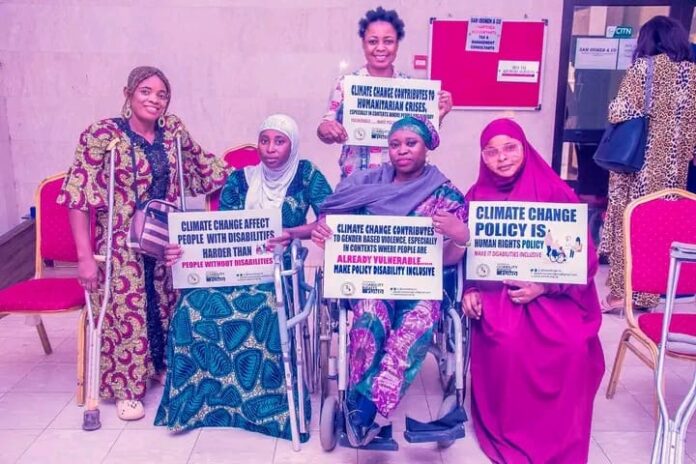Abuja, Nigeria – July 15, 2024
In a groundbreaking initiative aimed at addressing the intersection of climate change and disability, the Advocacy for Women with Disabilities Initiative (AWWDI), with support from the Disability Rights Fund, hosted a pivotal advocacy meeting at Edo House, Central Area, Abuja. This event marked a significant step towards inclusive climate action, highlighting the unique challenges faced by women with disabilities.
The meeting, which began at 10:00 AM with a unifying national prayer, set the stage for a day of profound discussions and strategic planning. Miss John Juliet opened the event with an impactful briefing on the dire consequences of climate change on Persons with Disabilities (PWDs). She underscored the urgency of targeted policy responses, emphasizing the disproportionate effects of climate change on women and girls with disabilities.
A Day of Insightful Presentations and Dynamic Discussions
The facilitator of the meeting delivered two highly insightful presentations. The first presentation elaborated on the project’s inclusive approach, revealing findings from a recent study on the impact of climate change on PWDs. The second presentation offered a comprehensive overview of the Nigerian Climate Change Policy, outlining its objectives and the necessity of inclusive disaster preparedness.
A highlight of the meeting was the dynamic session moderated by AWWDI’s National Coordinator, Miss Yakubu Bilikisu. This session featured feedback from key duty bearers and stakeholders, including representatives from the National Human Rights Commission, the National Commission for Persons with Disabilities, and the National Orientation Agency. These representatives shared their ongoing efforts and challenges in advocating for the rights and inclusion of PWDs.
Key Highlights and Outcomes
1. Presentation on Advocacy for Gender-Disability Inclusive Climate Change Policies
The facilitator detailed the severe impacts of climate change on PWDs, particularly women and girls. A poignant case study of a woman with a disability affected by flooding was presented, illustrating the heightened risk of Sexual and Gender-Based Violence (SGBV) due to climate change. The presentation also showcased AWWDI’s model for promoting disability-inclusive policies, emphasizing the need for comprehensive and targeted interventions.
2. Discussions on Policy Gaps
A critical discussion on existing policy gaps revealed significant shortcomings in current climate policies, including the exclusion of PWDs from emergency preparedness and response efforts. This session underscored the necessity for policies that explicitly address the unique needs of PWDs to ensure their safety and well-being during climate-related disasters.
3. Group Presentations
Participants engaged in group activities to develop concrete advocacy plans addressing the effects of climate change on PWDs. These plans included strategies for leveraging media in policy advocacy and emphasizing the importance of rightsholders’ involvement in policy development. The collaborative effort highlighted the collective commitment to advancing disability-inclusive climate policies.
Key Outcomes and Strategic Recommendations
The advocacy meeting achieved several significant outcomes, fostering a deeper understanding among stakeholders of the intersectionality of climate change and disability. The event strengthened partnerships, laying the groundwork for future advocacy efforts and leading to the formulation of strategic advocacy plans aimed at promoting disability-inclusive climate change policies.
Recommendations from the meeting included:
1. Policy Development:
Ministries are urged to ensure that climate policies explicitly address the needs of PWDs and advocate for amendments to align with the Convention on the Rights of Persons with Disabilities (CRPD).
2. Capacity Building:
Civil society organizations (CSOs), Organizations of Persons with Disabilities (OPDs), and Ministries, Departments, and Agencies (MDAs) should develop training programs on disaster preparedness and green job opportunities for PWDs.
3. Community Engagement:
Support for local initiatives addressing the needs of women and girls with disabilities in the context of climate change should be promoted, ensuring that these communities are actively involved in policy development and implementation.
4. Disaster Risk Reduction:
Government agencies should incorporate the needs of women and girls with disabilities into disaster risk reduction strategies, providing accessible emergency preparedness resources to ensure their safety and inclusion.
Conclusion
Today’s advocacy meeting was a significant milestone in advancing disability-inclusive climate change policies. AWWDI, supported by the Disability Rights Fund, successfully united policymakers, advocacy groups, and stakeholders to address the urgent need for inclusive climate action. The meeting underscored the critical importance of considering the unique vulnerabilities of PWDs and emphasized the collective effort required to ensure that no one is left behind in climate adaptation and mitigation strategies.
AWWDI remains committed to fostering an inclusive society where the voices of women and girls with disabilities are integral to climate policy development and implementation. The initiative looks forward to continued collaboration and advocacy to achieve a more equitable and sustainable future for all.
In the face of escalating climate challenges, today’s meeting serves as a beacon of hope and a call to action, ensuring that the rights and needs of PWDs are at the forefront of Nigeria’s climate response.


